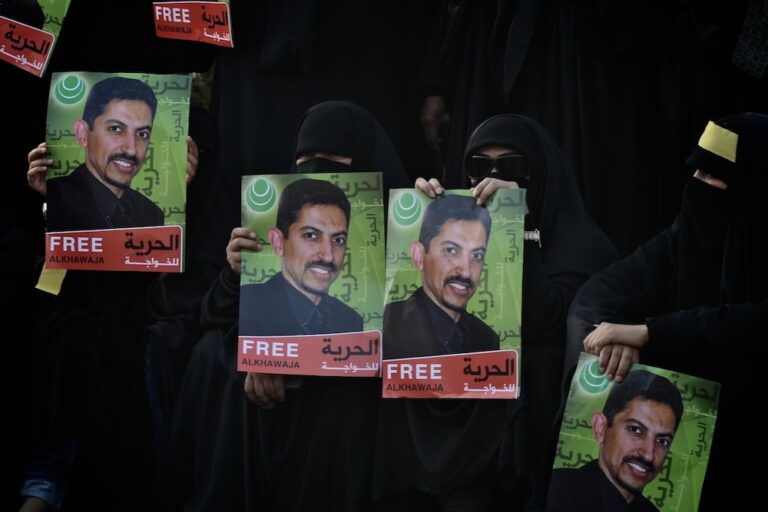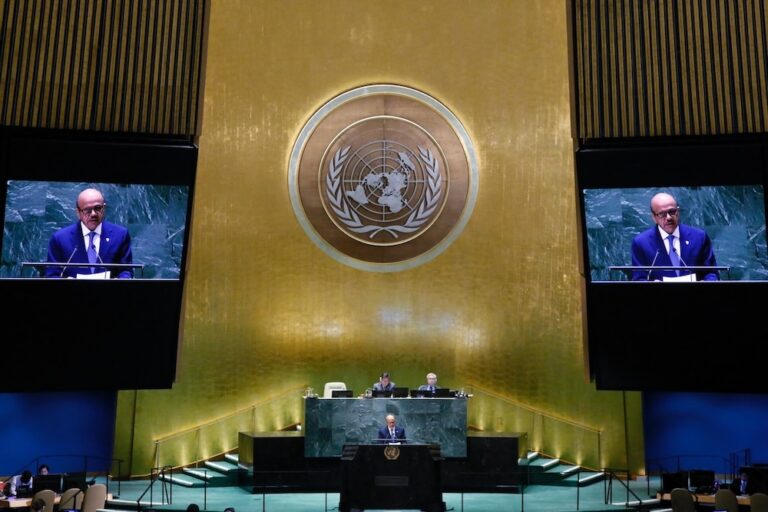The King was urged to commission an independent investigation into torture allegations.
(Human Rights Watch/IFEX) – Washington, DC, September 7, 2010 – Bahrain should stop threatening local rights defenders who have criticized the alleged torture of prominent opposition activists, Human Rights Watch said today.
In a letter to King Hamad bin Isa Al Khalifa on September 3, 2010, Human Rights Watch expressed grave concern after a pro-government newspaper linked Nabeel Rajab and Abd al-Hadi al-Khawaja, two prominent rights activists, to an alleged “terrorist network,” and accused them of providing “false information” to “international organizations” to prompt interventions that harm Bahrain’s reputation. Rajab and al-Khawaja are the president and former president, respectively, of the Bahrain Center for Human Rights (BCHR), an independent group whose legal standing the government does not recognize. Rajab sits on the Advisory Committee of Human Rights Watch’s Middle East division.
According to contacts with first-hand knowledge of interrogations by the public prosecutor of recent detainees, questions focused on the detainees’ ties to the BCHR as well as alleged contacts with international rights groups, including Human Rights Watch, rather than their alleged links to perpetrators of violence in Bahrain.
“This crude and unfounded public attack on Rajab and al-Khawaja is particularly distressing in light of reports from the BCHR and others about interrogations of persons arrested in connection with this so-called network,” said Joe Stork, deputy Middle East director at Human Rights Watch. “In addition to distressing allegations of torture, the interrogations appear to be focused on entirely legitimate contacts these individuals may have had with local and international rights groups.”
On September 1, the pro-government daily Al Watan featured a lead article alleging that Rajab and al-Khawaja are linked to a “terrorist network,” which the newspaper alleged had been responsible for attacking people and property in Bahrain as well as plotting to carry out sabotage in the country. Accompanying this article, both on the front page and inside pages of Al Watan, was a graphic display with their photos as well as photos of other alleged participants in this network, including three elected opposition members of parliament.
A similar article alleging that Nabeel Rajab is a member of this network appeared on the website of the official Bahrain News Agency on Saturday, September 4, although it was removed the following day. The BCHR and other local human rights groups have sharply criticized the government’s treatment of the detainees and publicized reports indicating that security forces have been involved in their torture and ill-treatment.
The Al Watan allegations appear despite a recent gag order from the government’s Public Prosecution Office (PPO) barring any coverage in any media of matters relating to the current arrests and official investigations aside from statements of the PPO itself.
In its letter to King Hamad, Human Rights Watch said that recent arrests of high-profile opposition leaders and activists “appear to be linked to public criticisms of policies of [the Bahraini] government rather than acts of violence or incitement to violence.”
Human Rights Watch noted that the initial arrests featured individuals who had participated in a London event where they criticized Bahrain’s human rights record. The PPO reportedly charged some of the individuals with alleged crimes such as “inciting hatred and contempt against the regime” and accused them of “contacting and working with international organizations.” On September 4, authorities arrested Ali Abd al-Imam, a prominent blogger who has managed the popular Bahrainonline.org web portal for more than a decade, reportedly for “spreading false information.”
Human Rights Watch called on King Hamad to commission an independent investigation into recent allegations of torture and ill-treatment of prominent opposition leaders and demonstrators by security forces.
Bahrain’s crackdown on opposition activists comes in the wake of a period of persistent street violence in which demonstrators have burned tires to block roads and thrown Molotov cocktails at security forces. In its letter to King Hamad, Human Rights Watch said that it upholds the government’s right and responsibility to protect persons and property from violent attacks and to maintain public order, but that it needs to meet this responsibility in a manner that respects basic rights.
Bahrain has ratified the Convention against Torture, which prohibits torture and other ill-treatment under all circumstances and prohibits the use of statements made as a result of torture as evidence in legal proceedings. In a February report, Human Rights Watch documented the systematic use of torture by security officials for the apparent purpose of securing confessions from security suspects in the 2007 to 2009 period. Bahraini officials claimed in response that torture is not systematic, and that any official found to be responsible would be punished, but to Human Rights Watch’s knowledge, there have been no independent investigations or prosecutions concerning cases documented in its report.
Bahrain is also a state party to the International Covenant on Civil and Political Rights, which protects freedom of expression and the right to receive and exchange information.
“It is with regret, therefore, that we address to you this letter, which is prompted by what appears to be an unbridled return to practices that routinely violate basic human rights,” Human Rights Watch wrote in its letter to King Hamad. “We urge you to once again take the lead in bringing these practices to an immediate halt and re-committing Bahrain to a path of respect for and protection of the human rights of all Bahrainis.”
Read the September 3, 2010 letter to King Hamad bin Isa Al Khalifa


